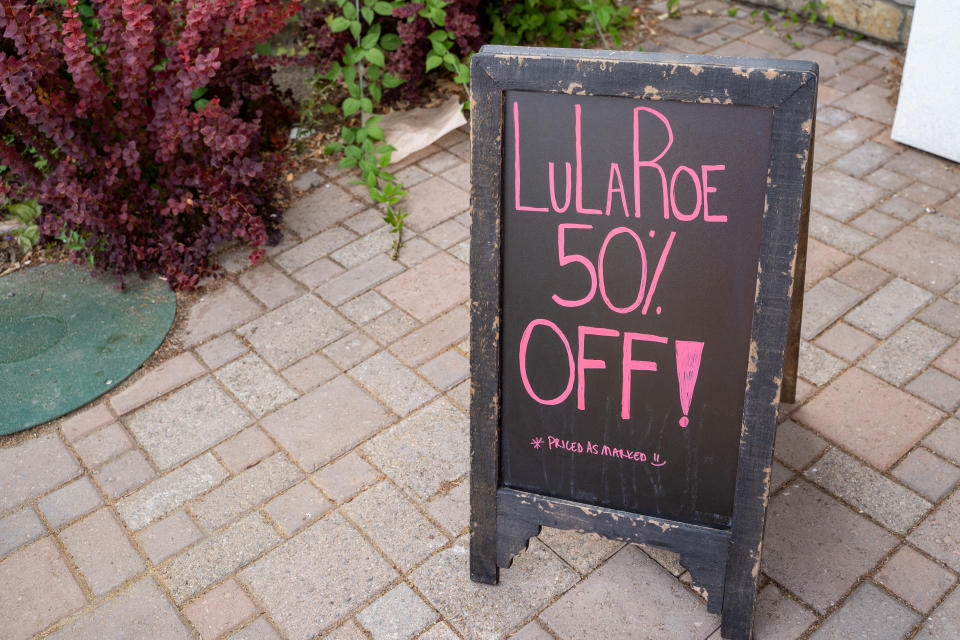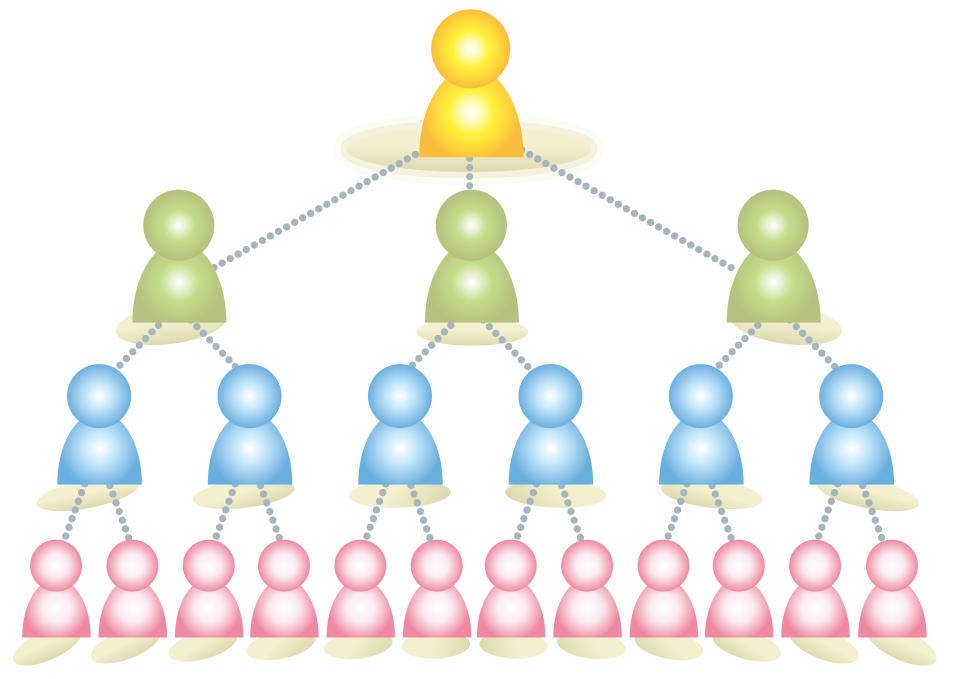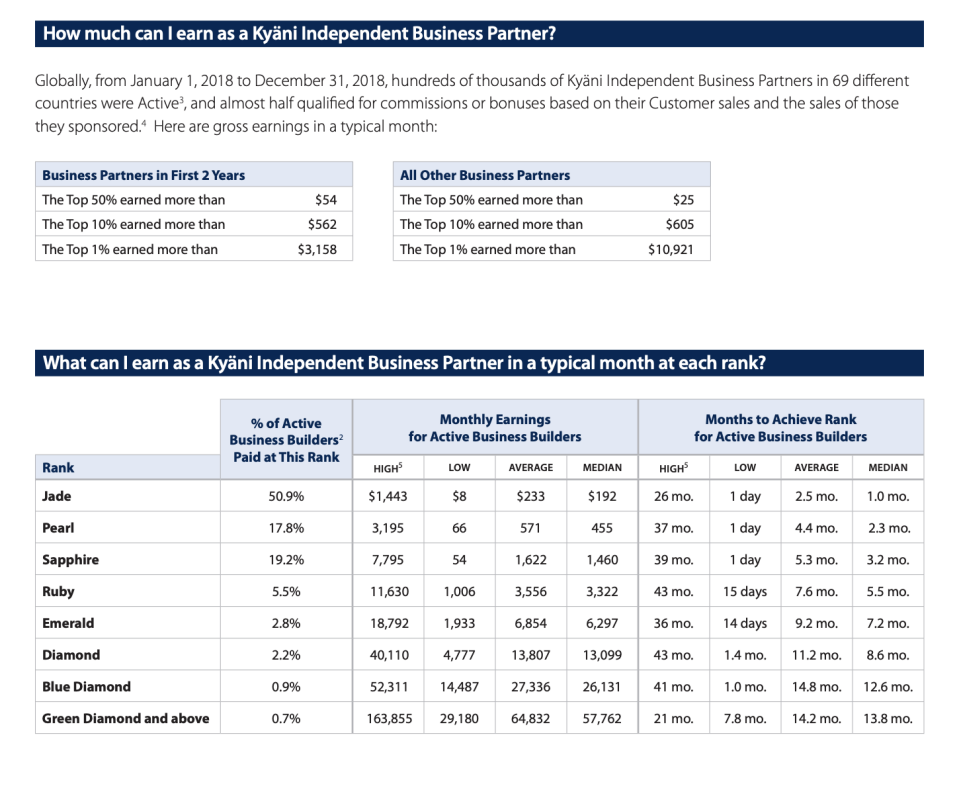Illegal Tender podcast: How 'MLM' schemes turn regular lives upside down
Listen on Apple Podcasts | Google Podcasts
This is part 1 of Yahoo Finance’s Illegal Tender podcast about the predatory practices of multilevel marketing companies or MLMs and how they harm women’s finances and relationships. Listen to the series here.
You may have a friend or relative who uses social media as their personal digital storefront to sell LuLaRoe’s psychedelic leggings, cosmetics from Arbonne and Younique, essential oils from DoTerra and Young Living, skin care products from Rodan + Fields or Lip Sense, shakes from Beachbody, or nail decals from Color Street.
Nearly 1 in 3 people have been pressured by a family member or friend to buy from their multilevel marketing companies (MLMs).

MLMs operate with a unique business structure and instead of retailing in brick-and-mortar stores or e-commerce, the products are sold by a network of independent distributors who don’t receive a salary or benefits. Distributors instead collect a commission from their sales and the sales of those they’ve recruited.
The sales and recruitment practices used by distributors have become the ire of everyone outside of MLMs. And for those inside MLMs, it’s a world of intimidation, manipulation, and lies that leave women broke and friendless.
Illegal Tender by Yahoo Finance is a podcast that goes inside mysteries in the business world. Listen to all of season three: Hey Hun: How MLMs are Leaving Women Broke and Friendless

MLM sales represent less than 1% of all retail sales in the United States, yet the companies are able to ensnare and tangle women by promising them upward economic mobility, a flexible work arrangement, and an opportunity for unlimited income.
Robert FitzPatrick, president of Pyramid Scheme Alert, a consumer advocacy organization, explains how women are targeted.
“Well, it's a person-to-person business without training,” FitzPatrick told the podcast. “These are commodity products, they are nontechnical products, they are household products. And so when you step back and look at what are the products that this multilevel marketing business is utilizing — and I say utilizing rather than selling because it is often based on people buying the product in order to participate in the business plan rather than just straight out simple demand for the product.”
Tiffany St. Lawrence, Kayla Imhoff, and a woman named Jessica who has requested her last name remain unknown are all former MLM distributors. Their involvement was brief, but they still carry pain caused by their time in MLMs. They initially saw MLMs as opportunities to make a little extra income but ended up in debt, destroyed friendships, and one jeopardized her marriage.
Listen on Apple Podcasts | Google Podcasts
Transcript:
Stephanie: Hey hun,
Hope all is well! It’s been a long time since we were on the softball team together. I love seeing pictures of your daughter and husband.
I wanted to reach out because I have this amazing opportunity I want to share with you. It’s a nutrition, skin care, and cosmetics company that I started. It’s seriously the best! I’m so passionate about it!
I know it’s been 15 years since we’ve seen each other, but I’m having a party at my house this Sunday. You can try all of the products. I love the shakes, they’re so delicious. They can also help you drop some of that baby weight I noticed you’ve been carrying around. I mean, wouldn’t it be so great to not go to the gym and be able to stay home with your daughter instead? But seriously, my life’s never been better. I’d just love to share it with you because my team of boss babes is recruiting for the ground floor and you’d be so perfect. There’s seriously never been a better time to join. I am making bank and you can too.
Will I see you Sunday? Let me know!
Sound familiar? It should. Nearly 1 in 3 people have been pressured by a family member or friend to buy from their multilevel marketing company or MLMs.
Don’t worry. This isn’t a sales pitch. I’m Stephanie Asymkos and I’m a reporter at Yahoo Finance. I’ve closely followed retail and personal finance news for the last few years. Even though MLM sales represent less than 1% of all retail sales in the United States, this world has caught my attention.
The MLM industry is such an insignificant blip in the U.S. economy that if disappeared tomorrow, nothing would really happen. But there’s a lot lurking beneath the surface of your sister in law’s or high school friend’s saccharine social media post. You know the kind I’m talking about, the emoji-heavy posts to describe how her world went from black and white to technicolor thanks to her Shakeology or ItWorks wraps.
The truth is, MLMs often become vicious traps that cost women their finances and friendships.
From Yahoo Finance, this is Illegal Tender season 4.

In this series, you’ll hear from three women and their MLM experiences. As you get to know them, you’ll hear them get emotional when they share how their friendships were manipulated and ultimately destroyed over MLMs. You’ll also hear how MLMs nearly destroyed a marriage, how $3,000 was wasted and why one woman needed to quit her job.
You’ll also hear from the experts. A lawyer who’s spent three decades representing ex-MLM distributors; a professor of business who’s closely followed MLMs for over 30 years; a longtime consumer advocate, and an expert who draws the parallel between cults and MLMs.
But before we get to all of that, we need to understand WHY anyone would join one of these in the first place.
Jessica: So it was late in 2018, sometime in the fall, possibly August, September, sometime around there, a former coworker of mine added me to a party on Facebook, um, which I'm sure that everybody's thinking, Oh yeah, I've been there, get added to about, you know, two to three parties every week probably. So the same thing with me. I got added to a color street party.
So my view of it was I can share this with other people that like it and get a discount on the products. And the way it was pitched to me was, Oh, absolutely, you can do this as a hobbyist. It's totally fine to do it that way. We won't pressure you to have any quotas, and you don't have to recruit anyone.
Illegal Tender by Yahoo Finance is a podcast that goes inside mysteries in the business world. Listen to all of season three: Hey Hun: How MLMs are Leaving Women Broke and Friendless
Stephanie: This is Jessica. She’s asked us not to reveal her last name. But for context, she is a stay at home mom in Michigan who joined Color Street, an MLM that sells nail decals, in 2018.
MLMs aren’t just for people like Jessica. We spoke to Kayla Imhoff. She’s a grad student living in San Diego. When she was an undergrad, she was laid off from her retail job. She was panicked about the thought of repaying her student loans after graduation, so she answered a Facebook message from an acquaintance.
Kayla Imhoff: It was somebody I'd known for a long time. We kinda had fallen out of contact, but I saw her posting a lot about, um, the business that she has started. And she was saying, you know, um, she was, she was just really blessed that this opportunity has come into her life and she just had all these business partners and she was just really enjoying what she was doing. And I immediately was interested. I was kind of like, wow, like, that sounds like a really cool thing. And I was really impressed that she had from a look, like she had started her own business. And finally she reached out to me.
Stephanie: The third voice is Tiffany St. Lawrence. In 2014, she moved from Virginia, where her family is from, to California, where her husband’s family lives.
Tiffany St. Lawrence: When after my husband and I got married, we were living in Redwood city in California. It was just not affordable, stay down there. So we actually moved, um, about an hour and a half North where we could afford to buy a home. And I helped open a brand new restaurant and Napa Valley. And so the, the chef and owner, his wife works or used to work with Mary Kay. I also don't know why she's left at this point, but she would bring up, um, she would bring up Mary Kay to all of the females in the restaurant on a regular basis. And then even try and convince the guys to, you know, buy products for their wives or girlfriends or their mothers or you know, you know how the list goes, you can sell it to the bus driver apparently. Um, she kept talking about it and I have always loved to wear makeup since I was a little girl. So I thought maybe if I sign up for it, at least I would get some decent makeup at, at a discounted price.

Stephanie: Now we know WHY and WHEN they got involved. Here’s a little primer on WHAT they got involved in. I’d be remiss if I didn’t discuss where MLMs fit into the zeitgeist and how they came to be.
MLMs have existed in their own world and the only mainstream attention they normally receive is when they get ripped on. Schitt’s Creek, It’s Always Sunny in Philadelphia and The Office, all have episodes where one of the main characters gets swept up in an MLM.
They lose their money and all credibility. Then thirty minutes later the whole thing is over and everyone had a good laugh at the expense of that character’s misfortune.
So if that’s all you know. It doesn’t seem so bad. In fact, it’s pretty funny. If you don’t happen to catch a piece of pop culture that spoofs an MLM, they would be out of sight and out of mind. Think about it, the products aren’t sold in stores; MLMs don’t advertise on TV or radio; the products aren’t miraculous or life-changing, and the demand is weak.
You would never know that there’s something else going on, however, MLMs are sending women into spirals of debt.
In this series, I use MLM but that’s inclusive of direct sales companies and networking marketing companies and referral marketing and person-to-person sales. That all means the same thing. There are different terms because some MLMs don’t want the stain associated with being an MLM.
You’re also going to hear distributor and consultant. Those mean the same thing. Both serve the same functions.
We all have a friend or relative who uses social media as their own digital storefront to sell LuLaRoe’s psychedelic leggings, cosmetics from Arbonne and Younique, essential oils from DoTerra and Young Living, skin care products from Rodan + Fields or Lip Sense, shakes from Beachbody, or nail decals from Color Street.
Illegal Tender by Yahoo Finance is a podcast that goes inside mysteries in the business world. Listen to all of season three: Hey Hun: How MLMs are Leaving Women Broke and Friendless

These distributors are the 21st century Tupperware Ladies and instead of hosting parties in living rooms, they have taken over social media to peddle their wares.
But none of this is news, right? And no, social media isn’t to blame here, but it certainly didn’t help. MLMs are so interwoven in the American narrative that we have to travel back to the 1800s to fully understand how we got to today’s hun bots — that’s what internet culture less than affectionately calls MLM merchants.
We start with the grittier side of American history. The stories that don’t exactly make the history textbooks because these folks weren’t exactly upstanding individuals. Their stories are ones of grifters, con artists, scammers, quacks, opportunists, fleecers, charlatans, you get the idea...
The term “snake oil salesman” is typically a dig, but you might not know where it comes from. Snake oil is a catch all term used to describe a product that promises the moon and the stars but instead leaves you with buyers’ remorse. Well, it wasn’t always that way. In the 1800s, an influx of Chinese people came to the United States as indentured laborers to build the Transcontinental Railroad and with them, they brought a centuries-old Chinese remedy: snake-derived oil loaded with omega-3s acids. The formula, which is still used today, has anti-inflammatory properties and eases aching joints. Two ailments that track with manual laborers who worked long shifts while exposed to the elements in exchange for very low pay. Historians report that the Chinese shared their homemade oil with the Americans, who marveled at the effects.
It took a couple of bad actors to ruin it for everyone and turn something that was useful into something synonymous with a hoax or ruse. Snake oil took off and scammers, who sometimes traveled by covered wagon, created knockoffs of concoctions with questionable ingredients and sold the products to the gullible masses.
But of course, these products didn’t hold up to the claims that were promised by the traveling salesmen. And as soon as there were rumblings of complaints from dissatisfied customers, there was zero recourse because the salesman was usually nowhere to be found. In darkness of night, he’d hightail it outta there, set his course for a new town and repeat the whole thing over again.
In the 19th century, snake oil salesmen were a nebulous group and no individual emerged from the bunch. That all changed with an Italian immigrant named Charles Ponzi. In 1920, he was able to amass an estimated $15 million dollars by persuading tens of thousands of Bostonians that he had unlocked the secret to wealth. His clients were seeing redic profits on investments in postal coupons. Amid the mania, what they didn’t know is that it was all smoke and mirrors. Ponzi was shuffling money from new investors to old ones.
The operation folded, Ponzi was convicted of mail fraud and deported back to Italy, but his wheeling and dealing left such an indelible mark that his name became synonymous with swindling and scamming.
In the 21st century, another Ponzi scheme made headlines, but this one wasn’t limited to Boston. It lasted for nearly two decades and bilked thousands of people out of millions.
Illegal Tender by Yahoo Finance is a podcast that goes inside mysteries in the business world. Listen to all of season three: Hey Hun: How MLMs are Leaving Women Broke and Friendless

Bernie Madoff, conman and thief extraordinaire, was able to sustain Bernard L. Madoff Investment Securities LLC, an elaborate Ponzi scheme until it met its demise during the Financial Crisis of the 2000s. Too many of his fund’s investors wanted liquidity so they asked Madoff for their cash back. A reasonable request except Madoff was pinched. He wasn’t able to keep up with the cash payouts because more money was exiting than entering and Madoff confessed to his family that the whole thing was a multi-billion dollar ruse. His adult sons, who worked for him yet claimed innocence in the scam, turned their dad into the police and Madoff was convicted. He’s currently serving a 150-year sentence for defrauding thousands.
So stay with me. We’re talking about generations of cheaters who fraud the masses. The snake oil grifters of the 19th century gave way to Ponzi in the 20th century who inspired modern criminals like Madoff. And somewhere in that timeline, another cheater is responsible for creating another type of fraud that implicates the masses. And that fraud is the pyramid scheme.
It’s generally harmless. But becomes harmful when money’s on the line.
I’ll let Robert FitzPatrick, the president of Pyramid Scheme Alert, a consumer advocacy organization, define it.
Robert FitzPatrick: A pyramid scheme, a is fairly easy to define. Everybody has some understanding of that they are illegal, they are inherit frauds. They are inherently deceptive. The simplest explanation: Robbing Peter to pay Paul. That is an enterprise in which people would invest and, um, promised a return and they have to pay money. Um, and the return depends entirely on new investors coming into the same plan. So any money they gain is based on getting some of the money from the people who come in after them. Every person who comes in therefore needs other people coming in after them.
The consequences of a pyramid scheme are loss for the great majority that get involved. That's inevitable. That can't change, that will always happen.
Stephanie: MLM defenders are all too eager to point out that MLMs are NOT pyramid schemes. And because I don’t want to get sued, I’ll go on record to say they are indeed different.
So how exactly are these two seemingly identical business models different? Robert can help us out again with defining an MLM.
RF: Well, in general, the government uses a theoretical definition of it. That is, it defines multilevel marketing as a sales organization. It does have products. They all almost all have products, they sell products. So it's a business that sells products, but it has a unique, and I mean completely unique structure and pay plan that you will not see anywhere else in the entire business world.
Stephanie: That unique structure Robert’s talking about is what makes an MLM an MLM. He’s right. Pyramid schemes don’t sell a product and MLMs do.
Let’s all learn the MLM language. Your upline is everyone above you in the chain. Everyone below you -- that is, if you’re successful at recruiting and I’ll get to that in a bit-- is called your downline. It’s a mystery why MLM distributors consider themselves self-employed entrepreneurs when there’s a clearly defined structure and hierarchy in place. At any rate, chalk it up as the first of many to dizzying MLM paradoxes.
RF: One other factor of multilevel marketing is that, um, you can theoretically sell your products. That is you could buy the product from the company or you can get the product from the company and sell it to customers. So it has a retail component to it. Um, however, I've been studying them for 20 years, I've looked at over 400 of them in detail and I've been involved in 32 court cases over this time and I've conferred with literally thousands of people involved.
And I've never found one person yet or one company yet in multilevel marketing where anybody actually does make money from just retailing the product.
Stephanie: Ponzi schemes, pyramid schemes and MLMs all overlap because they’re based on the endless chain. That means that there’s no end to the people who can join and the money that can be made. Well, we know that’s impossible because nothing is actually endless. Infinity doesn’t exist in a finite world.
Robert explained in our chat that if each recruit were to recruit five people and those five people were to recruit five people each, that chain would eclipse the world’s population after 13 cycles.
You’ll soon learn that the MLM industry is anything but transparent and that begins with the industry’s muddied origin story. It’s said to have originated in the 1930s when an American expat observed the Chinese lifestyle and diet. His creation was a dietary supplement that was said to provide people with important nutrients regardless of their eating habits. The mendacity didn’t stop there and the cures for depression, irregular heartbeat, tonsillitis, and some 20 other ailments were among the product’s bold claims.

This company was called Nutralite and its supplements were sold through a network of commissioned salespeople who were also incentivized to recruit more salespeople. Unsurprisingly, Nutralite got in trouble for bogus health claims. But two of its young salesmen stuck around long enough to learn then business model and then copy it.
Learning from Nutralite’s sins, friends Rich DeVos and Jay Van Andel, formed their own company but steered clear of health claims. First selling detergent and cleaning products, Amway, the godfather of MLMs, was founded in 1959.
Amway expanded its product line to toiletries, electronics, furniture, jewelry, cosmetics, pots and pans. By and large, anything you could buy from a Sears, Amway sold its own version and through an independent distributor. Theoretically, Amway products could be retailed, just as it with Sears, but Amway’s backchannel pitch was why work hourly at Sears when you can earn from sales and the sales of those you recruit to also sell Amway?
Old guard MLMs like Tupperware, Avon and Mary Kay were among the first to replicate Amway’s distributor model and formulated products to appeal to a certain segment of the population. What demographic overwhelmingly purchases cosmetics and household products? Women.
There’s never a chicken or egg when it comes to MLMs. The industry follows the crowd and does not set trends. Athleisure, the sartorial juggernaut, pre-dates LulaRoe and meal replacement shakes as diet strategies existed long before Beachbody. Those trends have been commodified by an MLM company, packaged and sold by a distributor with a social media filter.
But I digress, back to Amway. The company spread rapidly in the 1960s and 70s and was presented as an income opportunity. We know this is when women began joining the workforce on a much larger scale. We also know that women were heavily discriminated against in salary and opportunity, compared to male counterparts.
But this isn’t an issue of yesteryear. This still happens.
In 2018, over 57% of all women participated in the labor force, but they earned about 20% less than men. Societally women are looked upon as the family member who takes the lion’s share of housekeeping, child-rearing, education, caring for aging parents, and so on.
Enter MLM and an opportunity that’s presented as owning your own small business, a flexible work arrangement, no required training, minimal start-up cost and unlimited income.
Illegal Tender by Yahoo Finance is a podcast that goes inside mysteries in the business world. Listen to all of season three: Hey Hun: How MLMs are Leaving Women Broke and Friendless

Who wouldn’t take that bait?
Now MLMs aren’t meant inherently for women, but you can see just based on the promises MLMs have made since its age of dawn, there’s a lot there that appeals to women. That is, if any its promises were true.
Here’s Robert again to explain what’s happening here.
RF: Well, it's a person to person business without training. These are commodity products, they are nontechnical products, they are household products. And so when you step back and look at what are the products that this multilevel marketing business is utilizing, and I say utilizing rather than selling because it is often based on people buying the product in order to participate in the business plan rather than just straight out simple demand for the product. Well it, they turn out to be household items, clothing items, cosmetics and health products and who, who, of course, but conventionally, yeah. Conventionally appeals to women of course.
Stephanie: For 60 odd years, MLMs have cropped up like Hydra’s head and shapeshifted responding to market demands yet the pitch remains identical: Work as little or a much as you want, you’ll get out of the business what you put into it.
It’s no coincidence that MLMs are proliferating as the cost of child care is soaring. Many two-parent households are forced to make a tough call. Should both parents work outside the home and pay for childcare or should one stay home and eliminate that cost? Now feels like an appropriate time to mention that the United States doesn’t have federally mandated paid family leave.
And that brings us to today. Three in four of the country’s independent distributors are women — mostly white and between the ages of 35 to 54, according to the Direct Selling Association, an industry trade organization.
Your long lost friend from high school, the military spouse, your sister in law who is on long term disability, and women who, for whatever reason, are in transitional seasons of their lives, get recruited as foot soldiers in the 6 million strong MLM army. They shamelessly spam their networks to shill face wash, but more so, they want to become your self-appointed life coach and mentor and get you to also sell life affirming face wash.
They speak a certain language and use fourth wave feminism rally cries like “girl boss,” “boss babe,” and “fake it ’till you make it.” These mantras have been co-opted by the MLM community to sell a fantasy: With only a $49 starter kit, you can become the founder, president, and CEO of your own business. With the liberal use of the word empowerment, MLMs sell women a special kind of product: Themselves.

The #MomBoss and #SideHustle content that promises entrepreneurship isn’t only in the social media profiles of the distributors. Marketing materials and literature packaged in pastels and curlicue fonts claim that women can have it all by saying yes to an endeavor that’s presented as more of a cutesy hobby that pays you in spades. All they have to do is “share the opportunity” and that enables them to raise their children and make an income by not having a job outside of the home. An MLMs recruitment pitch draws a solid line from your fluorescently-lit cubicle to playing with makeup all day! You’ll emancipate yourself from the monotonous 9 to 5. Say goodbye to your dreadful boss and rush hour traffic. You’ll be able to work from your smartphone while your baby is napping! You’ll inspire others! You’ll be a coach!
Becoming an MLM independent distributor doesn’t come with any of the rigorous legwork associated with being a business owner or franchisee. There’s no business plan to draft; no concept in need of proofing; no focus groups; no product development; no patent to file; no research and development; no competitive analysis; no zoning to prevent market saturation. I mean, there’s not even a job interview. MLMs will take anybody with the cash (or credit) to put up for a starter kit. Zero vetting required.
So then what happens? You’re sold on an idea, a dream, opportunity, you’re about to tell your boss to take a hike, but no one’s told what you’re going to actually do.
You get taken.

 Yahoo Finance
Yahoo Finance 
